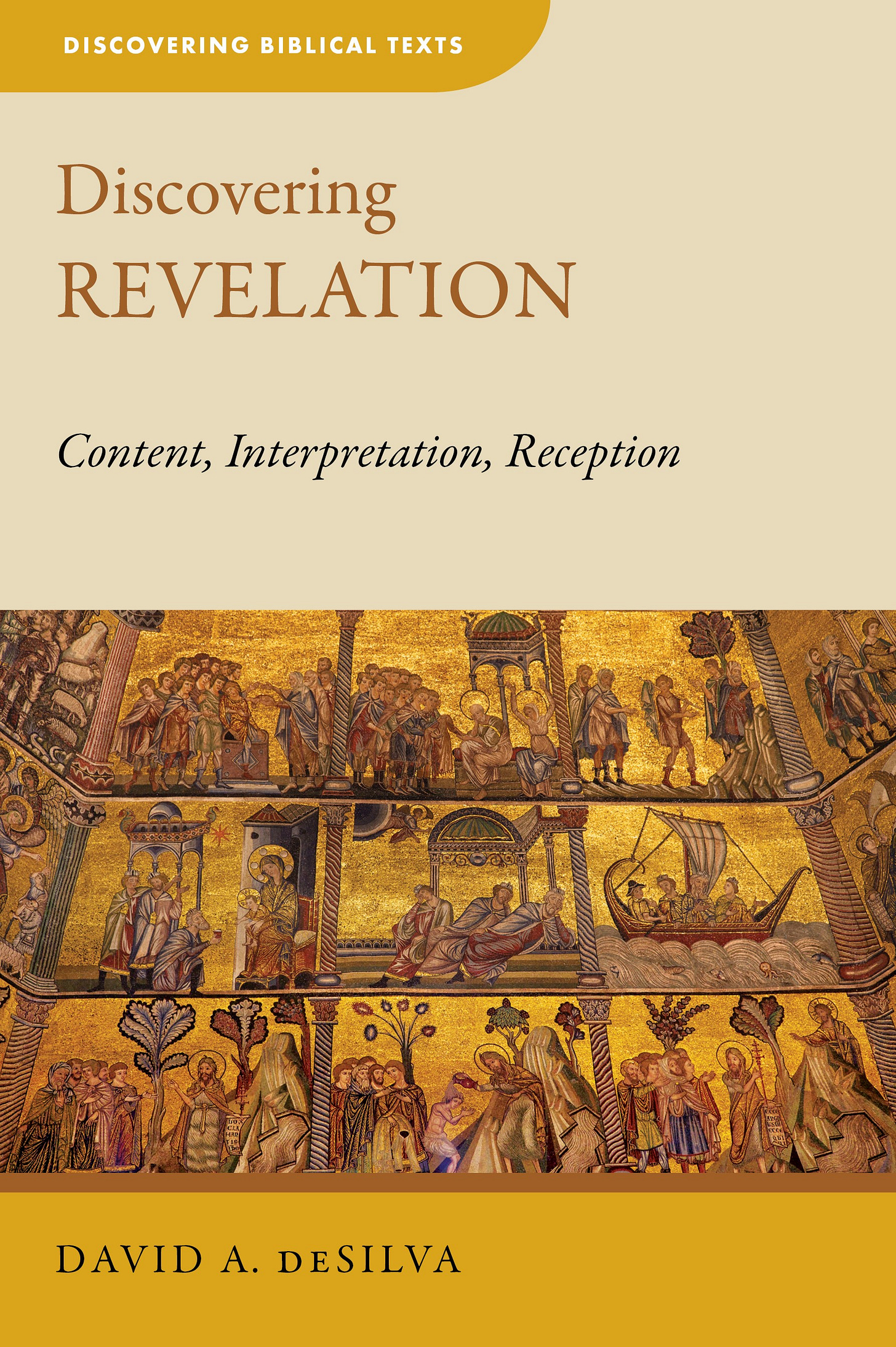David deSilva on Discovering Revelation
David deSilva is one of the top Book of Revelation scholars around today. He’s written a couple of good books on it - Unholy Allegiances and Seeing Things John’s Way - and this one showcases his ability to explain disputed and technical topics in an accessible and memorable way.
The book opens by noting how Revelation gets a mixture of responses, either crazy fascination or else cringing repugnance.
DeSilva notes too that despite the many approaches to Revelation, they are not all equally valid:
The history of Revelation’s effects also suggests that, particularly in regard to this book, openness to multiple approaches to interpretation does not conduce to openness to all approaches to interpretation. The saying of Jesus in regard to prophets who will claim to speak in his name is especially apt in regard to interpreters and interpretations of Revelation: ‘By their fruits you shall know them’ (Matt. 7.16).
Thereafter, deSilva has chapters about the three worlds of Revelation: behind the text (author and historical setting), within the text (literary and narrative dynamics), and in front of the text (readers and interpreters). Plus he details the genre of Revelation as letter, prophecy, and apocalypse. This is followed by discussions of the origins and transmission of the text (origins, date, authorship, style of Greek) and then the social and historical setting (esp. the significance of the imperial cult). I think deSilva does a good job of showing how the claims about the greatness of the Roman empire in Virgi’s Aeneid provide a backdrop to the Book of Revelation.
The rest of the book is basically a mini-commentary on Revelation with an accessible explanation of the imagery, story, and commands of the text. Concerning Revelation 4, deSilva writes:
John’s vision of God enthroned and of the personnel and activity around God’s throne, if imaginatively engaged by his audience, cannot fail to arouse emotions that are strategic to John’s pastoral aims for his communication. A primary emotion here must be awe - an emotional response frequently targeted in the world of John’s audiences. The massive temples in their cities with the colossal images of their resident deities … were staged with a view to renewing awe towards the powers upon whose favour a stable life was believed to depend. Falling back into such responses was no doubt an ever-present temptation for ‘recovering pagans.’
Concerning the millennium in Revelation 20, he states:
The vision of the thousand-year reign assures John’s hearers that the faithful - and, above all, those who are faithful unto death - will be vindicated, even as Christ was. … The vision of the thousand-year reign, then, is concerned primarily with God’s justice towards his faithful and, above all, towards those who have sacrificed the most for the sake of their loyal obedience.
The final chapter offers advice on interpretation, not looking for one-to-one correspondences (e.g., ten crowns = ten nations of the EU), but considering Revelation as a way of offering a diagnostic analysis of the church and its surrounding culture. In the end, he tells us:
Revelation calls the Christian community to take up its task of prophetic critique of political and economic systems that secure the prosperity and well-being of some at the expense of others.
As for whether I prefer deSilva Discovering Revelation over Koester’s Revelation and the End of All Things, I can’t say, it’s a dead heat. But definitely recommended for pastors and students!



I’ve read some material - commentaries included - on Revelation. It appears that the Preterist view should get more support than it does, at least the partial Preterist view. The fulfillment of the Old Covenant by, in, and through Jesus, with his death and resurrection, and the outward evidence of that in 70 AD, is often minimized. Could it be that the ‘New Creation’ the New Testament refers to is not of the space time universe, but of Christ’s people (2. Cor. 5:17)? Jesus basically said the only thing greater than raising someone from the dead is if they hear the gospel, believe it, and are resurrected spiritually in this life, and physically in the next. So many people are waiting for the material universe to be re-created, when the new creation has occurred and is continuing to occur, as people experience the new birth and life that Jesus gives. Aren’t Jesus’ people the new creation, the new meeting place of heaven and earth, the ones in whom God dwells? Surely, this is greater and far more significant than a physical remaking of the cosmos, isn’t it? Maybe the new universe, the new creation, is God’s new humanity dwelling on earth, with a new spiritual capacity wrought by God himself. There is absolutely nothing greater than being filled with the third person of the Trinity, enabled to enter the heavenly throne room at any time, guaranteed that One ear will always hear our prayer. People are ‘waiting’ for the new creation that has occurred already, spiritually, and is greater than any remaking of material structures could ever be. We need to realize what has happened to us already, instead of waiting for something less substantial to happen sometime in the unknown future.
This being a new book, I am just being made aware of it. It seems to me the Preterist view in some form is head and shoulders above others. Having been a pastor for over 45 years and a long time student of Revelation, and after recently preaching on Revelation for a year, I wrote my own book on Revelation: Worthy is the Lamb: The Book of Revelation as a Drama. Check out my website: https://www.revelationdrama. Drew is right on in his comments!